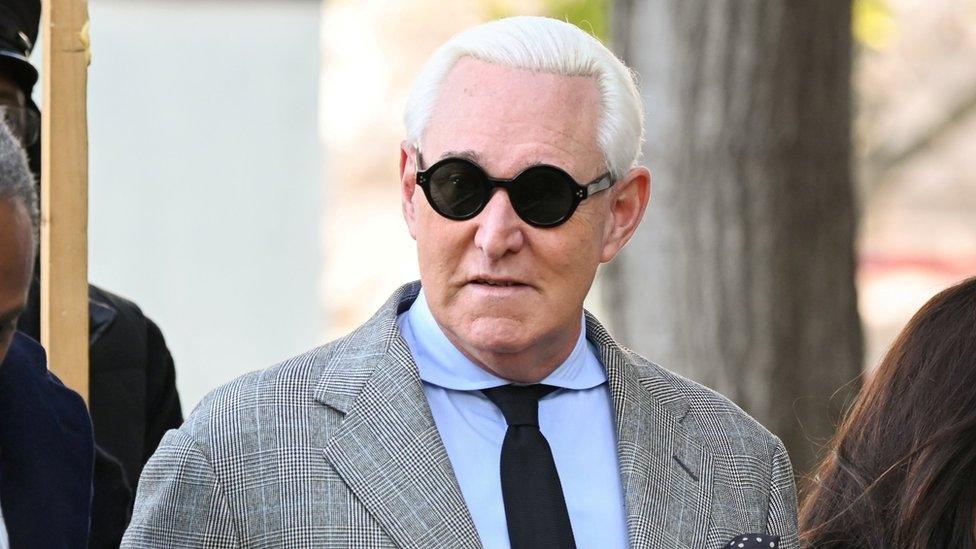Roger Stone: Robert Mueller defends indictment over Russia probe
- Published
Roger Stone speaks to reporters reacting to Trump's decision to grant clemency
Former US special counsel Robert Mueller has made a rare public intervention to defend his indictment of former Trump adviser Roger Stone.
Stone was found guilty on charges linked to an investigation led by Mr Mueller that found Russia tried to boost the Trump 2016 election campaign.
President Donald Trump commuted Stone's 40-month jail sentence on Friday saying he was the victim of a "witch-hunt".
In the Washington Post, Mr Mueller said Stone was rightly a convicted felon, external.
Stone was convicted of obstruction, witness tampering and lying to Congress.
The president's move - sparing Stone from jail but not granting him a pardon - came just after a court denied Stone's request to delay the start date of his prison term.
Leading Democrats and a few Republicans have condemned Mr Trump's decision, saying it undermined the justice system.
The White House said that Department of Justice prosecutors under Mr Mueller only charged Stone out of frustration after failing to prove the "fantasy" that the Trump campaign had colluded with the Kremlin.
What do Mueller and others say?
Mr Mueller writes that he felt compelled to respond to claims that his investigation had been illegitimate, his motives improper, and Stone a victim.
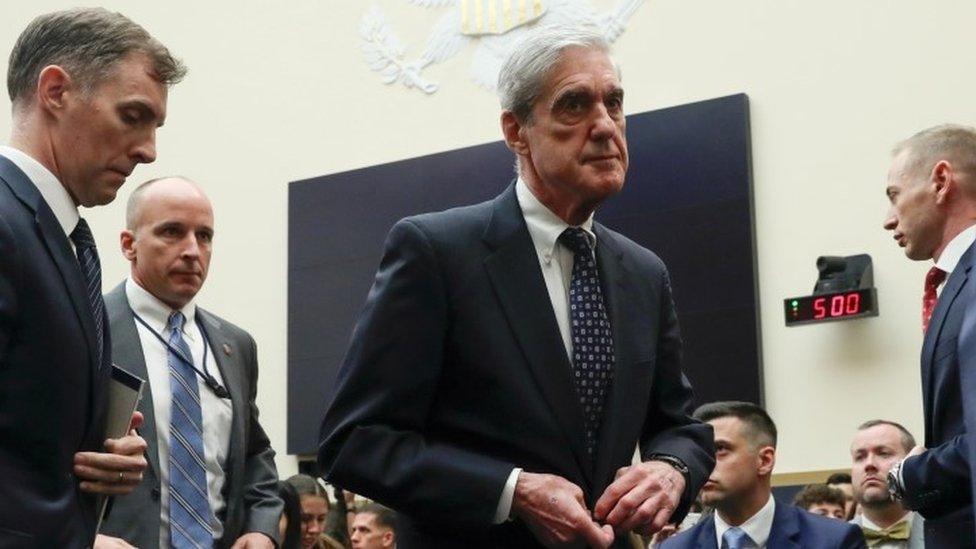
Mr Mueller's article is his first public statement since he gave testimony to Congress last year
"The Russia investigation was of paramount importance. Stone was prosecuted and convicted because he committed federal crimes. He remains a convicted felon, and rightly so," he wrote.
He said that finding evidence of Russian interference was a complex task that took "two years and substantial effort" and resulted in a number of charges and prosecutions. Stone's obstruction may have impeded efforts to find the truth and hold wrongdoers accountable, he added.
"We made every decision in Stone's case, as in all our cases, based solely on the facts and the law and in accordance with the rule of law," he concluded. "The women and men who conducted these investigations and prosecutions acted with the highest integrity. Claims to the contrary are false."
Mr Mueller rarely makes public statements about the investigation, and the article is the first since he gave testimony in Congress in July 2019.
His reaction follows strong condemnation by senior Democrats, with presidential contender Joe Biden's spokesman accusing Mr Trump of abuse of power and "laying waste" to US values.
Democratic Senator Elizabeth Warren said it showed Mr Trump was the most corrupt president in history.
Some Republican critics of Mr Trump have also spoken out, with Senator Mitt Romney describing the president's decision as "unprecedented, historic corruption".
Allow X content?
This article contains content provided by X. We ask for your permission before anything is loaded, as they may be using cookies and other technologies. You may want to read X’s cookie policy, external and privacy policy, external before accepting. To view this content choose ‘accept and continue’.
What does the president say?
In a tweet on Saturday, external, Mr Trump said: "Roger Stone was targeted by an illegal Witch Hunt that never should have taken place."
Earlier, the White House said in a statement that Stone was "a victim of the Russia Hoax that the Left and its allies in the media perpetuated for years in an attempt to undermine the Trump Presidency".
It also suggested that the FBI had tipped off CNN about their pre-dawn raid on Stone's house, noting that a camera crew for the cable network was on the scene to record the arrest.
Mr Trump had been hinting about a reprieve for Stone for months, including on Thursday night in an interview with a Fox News host.
Trump ally Senator Lindsey Graham was among those welcoming the decision. He said Stone was convicted of a "nonviolent, first-time offense" and the president was "justified" in commuting the sentence.
Stone himself told reporters that under the terms of the commutation he could now appeal against his sentence, and was confident that he could expose "an enormous amount of corruption" at his trial.
What was Stone convicted of?
The president's commutation does not void a criminal conviction as a pardon does.
Stone was found guilty of lying to the House Intelligence Committee about his attempts to contact Wikileaks, the website that released damaging emails about Mr Trump's 2016 Democratic election rival Hillary Clinton.
US intelligence officials have concluded the messages were stolen by Russian hackers.
Stone had acknowledged during the 2016 campaign that he was in contact with Wikileaks founder Julian Assange.
He also intimated that he knew the website would disclose more than 19,000 emails hacked from the Democratic National Committee servers.
Trump: 'I'd love to see Roger Stone exonerated'
Stone's sentence fell short of an initial seven-to-nine-year recommendation from prosecutors.
In a remarkable move, US Attorney General William Barr had overruled that sentencing guideline following a Trump tweet, and instead recommended a more lenient punishment.
That intervention led to the entire Stone prosecution team resigning from the case.
- Published23 July 2019
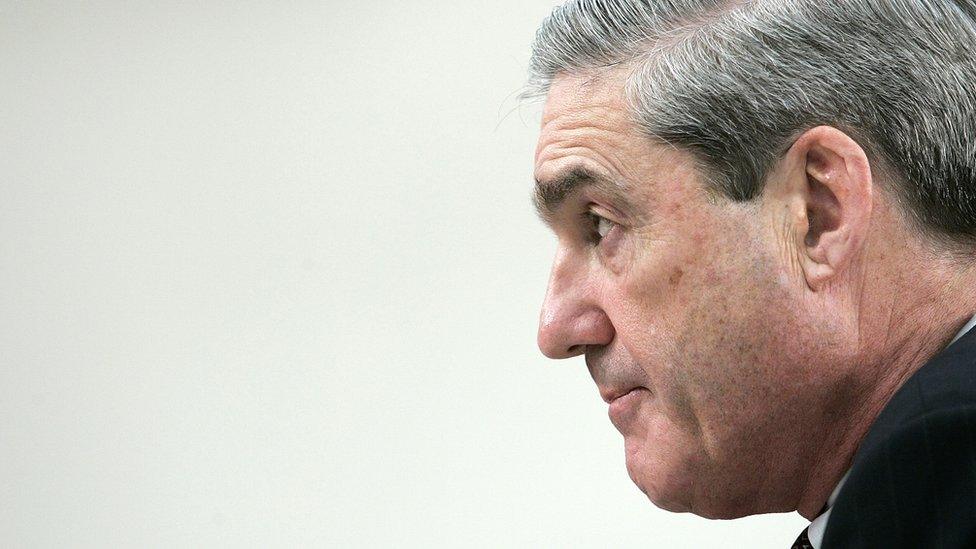
- Published25 July 2019
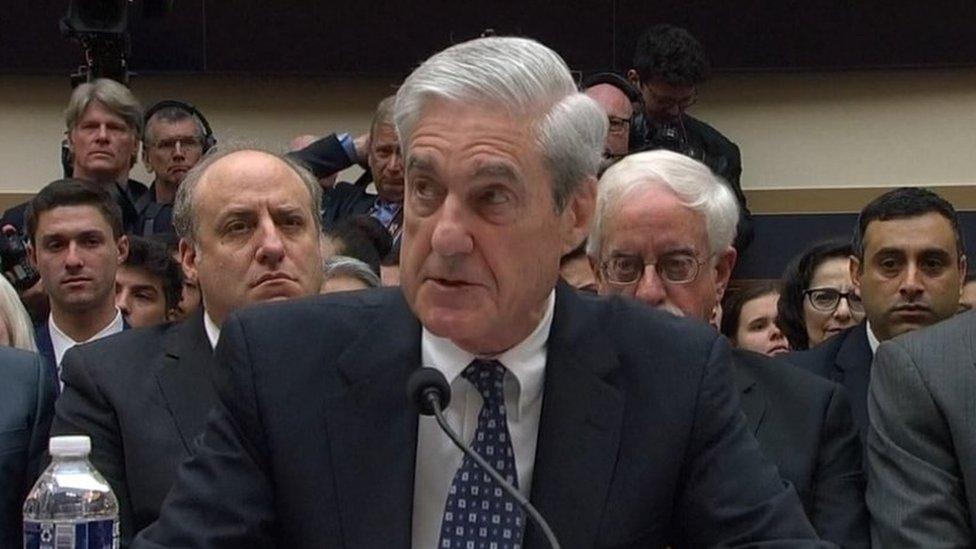
- Published20 February 2020
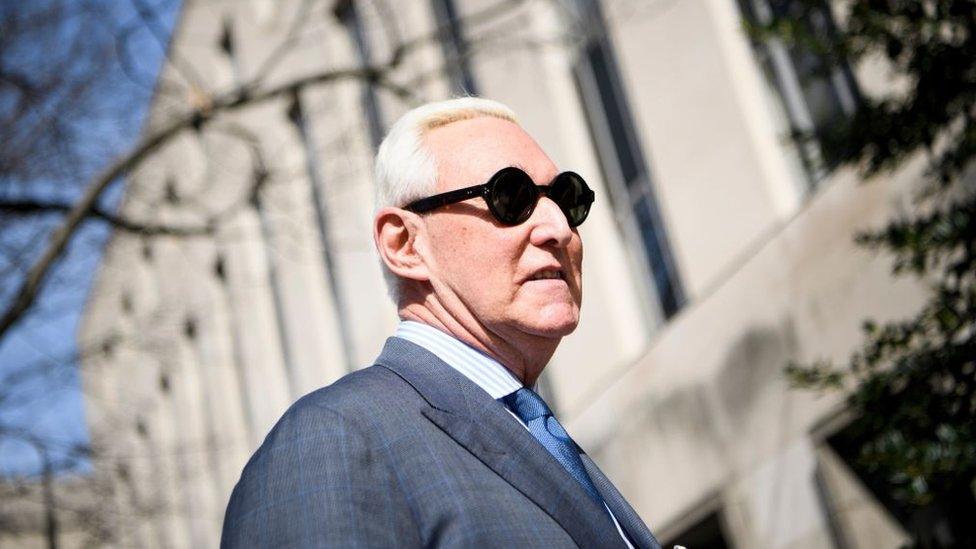
- Published24 December 2020
